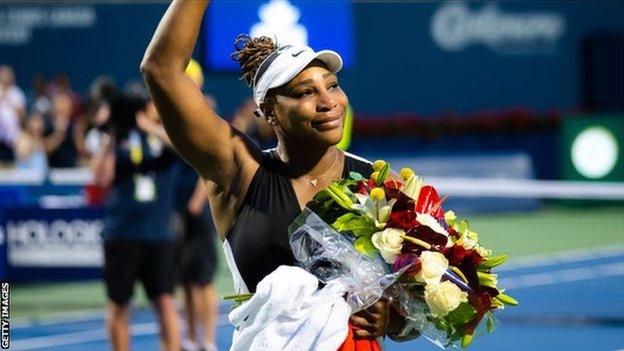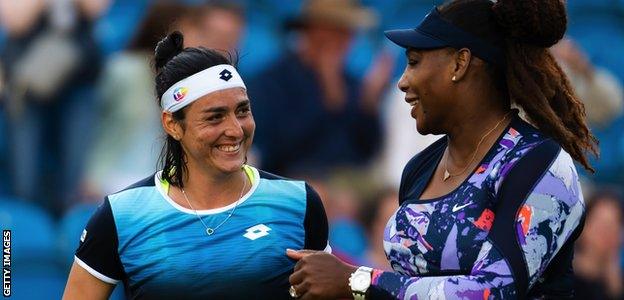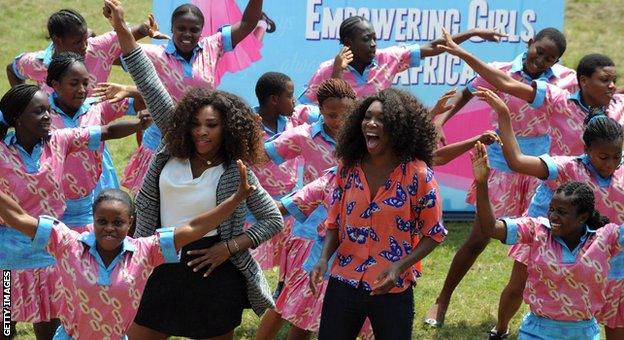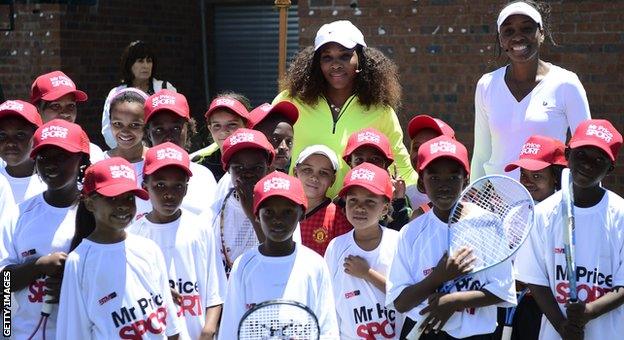Serena Williams leaves legacy to African tennis as 'inspiration' for girls
- Published

Williams' total of 23 Grand Slam singles titles is more than any woman in the Open era
When Serena Williams walks out onto the courts of Flushing Meadows at the US Open next week, what appears to be her farewell from tennis will be keenly felt in Africa.
Since the 40-year-old turned professional in 1995, winning her first Grand Slam trophy four years later, both Serena and her older sister Venus have become iconic figures.
"Serena has been the 'be-all' for African tennis, and especially for girls in Africa," Tennis Kenya secretary general Wanjiru Mbugua Karani told BBC Sport Africa.
"I can assure you there is nobody you ask who is their greatest player - who's a girl in Africa - that would not say Serena.
"They're all so inspired to see a black girl being at the top of the tennis world and being one of the world's greatest athletes. Everybody's totally inspired by Serena."
Williams indicated that this year's US Open is likely to be her last professional tournament as she prepares to "evolve" away from the sport.
Mbugua Karani says African hopefuls such as Kenyan teenager Angella Okutoyi, who won the Junior doubles title at this year's Wimbledon, are already reaping the benefits of Serena's legacy.
"If you ask Angella, the mentor - the star she would like to emulate - is obviously Serena Williams," Mbugua Karani said.
"It's extremely important, especially in a sport like tennis where we do not have many black girls, for her to see another black girl at the top.
"She gets so inspired. She knows she can achieve [things in tennis] because there's somebody ahead of her who has done this. And Serena and Venus really inspired a lot of black girls.
"Tennis was a white man's game in Africa. But when these two girls started playing, all of a sudden we all discovered we could play and get into tennis.
"They have been more than just tennis players. They have been totally inspirational, and especially Serena for 23 Grand Slam titles. It's just unbelievable what she has been able to achieve."
Serena 'will not be forgotten'

Williams played doubles with Tunisia's Ons Jabeur, Africa's top-ranked singles player, at the Eastbourne International in June
Away from the court, Williams will also be remembered for speaking out against racism, pushing for gender parity and equal prize money, and about her experiences of the healthcare system as a black woman.
Her individuality has helped her stand out, according to Mbugua Karani, and given African women body-positivity.
"She played her own game, she's her own person," the 49-year-old said.
"She's hardworking like crazy. Her body is a very African body.
"And for those girls, just wondering, worrying too much about 'I need to be a certain way', they can see [their] African body is enough to be able to play this game.
"On top of that, she has a business mind. She's kind, and she started a family. So these are just some of the things that the girls have been looking up to."
Emotions will be high when Williams finally bows out of the sport next week, with her millions of fans across Africa amongst those who will feel her absence from the court.
Mbugua Karani says this US Open will be more keenly watched than ever as Serena's supporters hope for a fairy-tale end to an exceptional playing career.
However, last week she lost to British number one Emma Raducanu in straight sets in the first round of the Cincinnati Open.
"I'm praying for her that she will give it her best shot and leave having known she gave it her best shot," she said.
"We will certainly miss her. Every time she speaks to the media, we are always listening. We have a big screen at Nairobi club and whenever she's playing the club is full with guys just coming to watch her match more than anybody else's.
"But she will not be forgotten. We will see another amazing chapter from her."

Serena Williams and her sister Venus (centre right) attended an event promoting female empowerment in Lagos, Nigeria, in 2012

After their trip to Nigeria a decade ago the sisters held a tennis clinic at the Arthur Ashe Academy in Soweto, South Africa